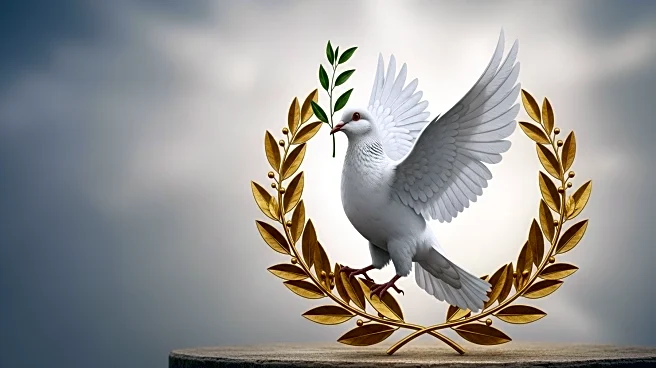What's Happening?
Maria Corina Machado, a Venezuelan opposition leader, has been awarded the Nobel Peace Prize for her efforts in promoting democratic rights and peace in Latin America. The Norwegian Nobel Committee recognized her for her struggle to transition Venezuela from dictatorship to democracy. Machado, who remains in exile within Venezuela due to threats to her life, dedicated her win to President Trump for his support of her cause. President Trump, who has been actively involved in peacemaking efforts, particularly between Hamas and Israel, was also a contender for the prize. Despite his efforts, including a 20-point plan for Gaza, he did not win the award.
Why It's Important?
The awarding of the Nobel Peace Prize to Maria Corina Machado highlights the international recognition of efforts to promote democracy in regions facing authoritarian rule. Her win underscores the global support for democratic movements in Latin America, potentially encouraging further international involvement and aid. For President Trump, missing out on the prize despite his peacemaking efforts may impact his political standing and influence in international diplomacy. His initiatives, particularly in the Middle East, have been significant, but the lack of recognition could affect his future diplomatic engagements and the perception of his administration's foreign policy achievements.
What's Next?
Maria Corina Machado's recognition may bolster her efforts and those of her supporters in Venezuela, potentially leading to increased international pressure on the Venezuelan government. For President Trump, the focus may shift to consolidating his peacemaking efforts and seeking other forms of recognition for his initiatives. The Nobel Committee's decision could influence future nominations and the criteria for awarding the prize, possibly encouraging more focus on democratic movements and peace efforts in regions under authoritarian rule.
Beyond the Headlines
The Nobel Peace Prize awarded to Machado may inspire other opposition leaders in similar situations to continue their struggle for democracy, knowing that their efforts can gain international recognition. It also raises questions about the criteria for the Nobel Peace Prize and how political dynamics influence the selection process. The decision not to award President Trump, despite his significant peacemaking efforts, may lead to discussions on the role of political leaders in peace processes and the impact of their actions on global peace and stability.











